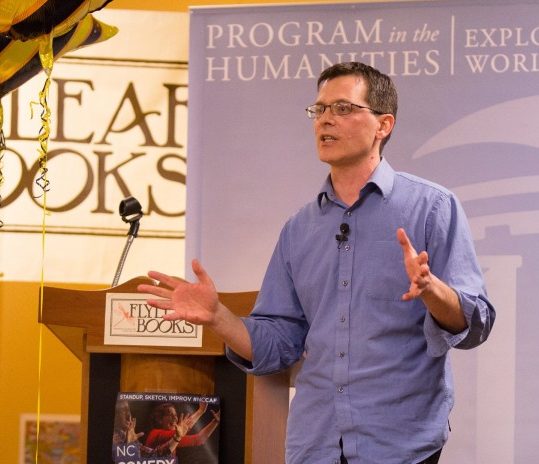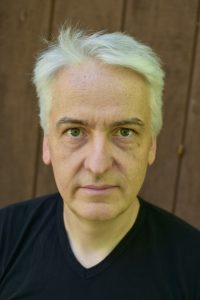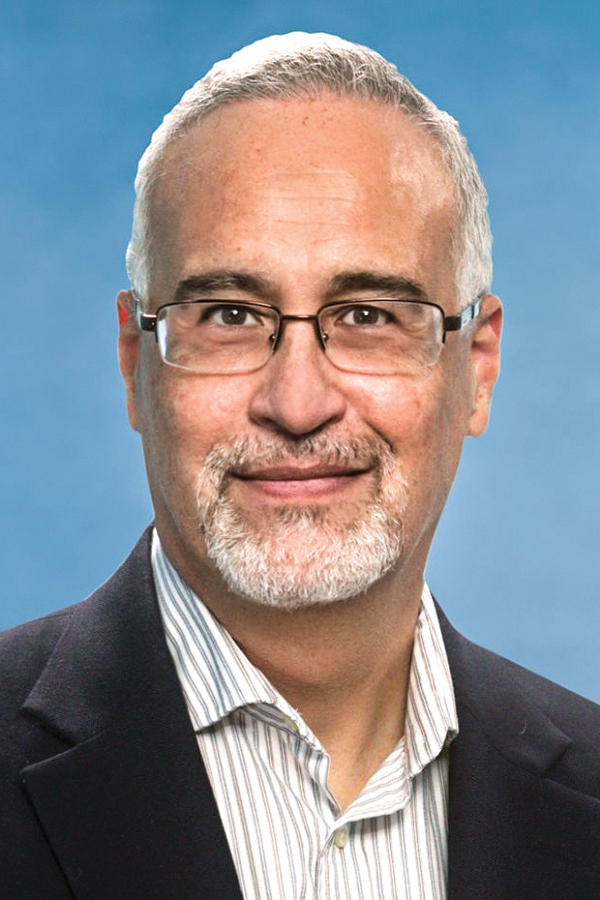 Max is the executive director of Carolina Public Humanities and teaching assistant professor of history. A graduate of the University of Vermont, Dr. Owre obtained his PhD in modern european history from UNC in 2008. He is a lecturer in the history department at UNC, where he teaches courses in European, world and French colonial history. Max is a principal organizer, and frequent host and moderator, of Carolina Public Humanities events. He also lectures frequently for Carolina Public Humanities on various topics in French and European history.
Max is the executive director of Carolina Public Humanities and teaching assistant professor of history. A graduate of the University of Vermont, Dr. Owre obtained his PhD in modern european history from UNC in 2008. He is a lecturer in the history department at UNC, where he teaches courses in European, world and French colonial history. Max is a principal organizer, and frequent host and moderator, of Carolina Public Humanities events. He also lectures frequently for Carolina Public Humanities on various topics in French and European history.
Consider This … Artificial Intelligence
Tuesday, Oct. 24 | 6:30-8 p.m.
The Carolina Club (Alumni Hall), 150 Stadium Drive, Chapel Hill or via Livestream
Free and open to the public
Sign up today and see live stream information below.
Submit any questions you may have during the sign-up process.
Thank you for registering for the Consider This…Artificial Intelligence panel discussion tonight from 6:30 – 8:00 p.m.
For those joining us in person, we are in Alumni Hall 1 at the Carolina Club – 150 Stadium Dr.
Paid parking is available in Ram’s Head Deck. Click here for directions to the deck. Once parked, follow the signs to the Carolina Club.
If space is available, you may also park on Stadium Drive after 5:00 p.m. for a nominal fee. Please be sure to look for a payment kiosk.
If you are joining by Zoom, please use the link below.
- There is no need to register but to join you will need to enter your name and email address in order to access the livestream.
- The waiting room will open ten minutes before the event and you will be admitted to the livestream prior to the discussion starting.
- Q&A will be enabled via Zoom but priority will be given to previously submitted questions.
https://unc.zoom.us/j/96101520247
Join us in person or via livestream at this complimentary Consider This … Artificial Intelligence forum for a discussion on the growing influence of artificial intelligence and machine learning. It’s not just the technology that’s changing but the impact on our daily lives in ways we might not yet understand. We’ll examine different issues associated with this topic and provide different perspectives from those you have already heard.
As machines start learning more, and do more, their impact and influence will continue to grow. How is this technology showing up in our lives? Is this growing knowledge and influence something to embrace or to approach with caution? What happens to teaching and learning when new technologies emerge and begin to disrupt the old ways? What ethical issues should be considered when looking at these issues?
Moderator: Max Owre '08 (PhD)
Mohit Bansal

Mohit is the John R. & Louise S. Parker Professor and the director of the MURGe-Lab (UNC-NLP Group) in the Computer Science department at UNC. Prior to this, he was a research assistant professor at TTI-Chicago. He received his PhD in 2013 from the University of California at Berkeley and his B.Tech. from the Indian Institute of Technology at Kanpur in 2008. His research expertise is in natural language processing and multimodal machine learning, with a particular focus on grounded and embodied semantics, language generation and Q&A/dialogue, and interpretable and generalizable deep learning. He is a recipient of DARPA Director’s Fellowship, NSF CAREER Award, Google Focused Research Award, Microsoft Investigator Fellowship, Army Young Investigator Award (YIP), DARPA Young Faculty Award (YFA), and outstanding paper awards at ACL, CVPR, EACL, COLING, and CoNLL. His service includes ACL Executive Committee, ACM Doctoral Dissertation Award Committee, CoNLL Program Co-Chair, ACL Americas Sponsorship Co-Chair, and Associate/Action Editor for TACL, CL, IEEE/ACM TASLP, and CSL journals.
Matt Bernacki

Matt Bernacki – Donald & Justeen Tarbet Distinguished Scholar
Associate Professor at the School of Education
Program Coordinator of the Learning Sciences and Psychological Studies Program (PhD)
Prior to arriving at UNC, Matt held post-doctoral appointments at the Learning Research & Development Center (University of Pittsburgh) and the Human Computer Interaction Institute (Carnegie Mellon University) through the jointly-housed LearnLab, and a faculty appointment in Educational Psychology and Higher Education at the University of Nevada, Las Vegas. Matt’s research focuses on (1) the roles that motivations and metacognitive processes play when learners use technologies like hypertext, intelligent tutoring systems, and learning management systems, (2) the development of interventions and software to promote effective learning strategies, and motivation to learn AND (3) the development of learning materials and environments that personalize learning to students’ interests.
Thomas Hofweber
Thomas is a professor of philosophy at the UNC. He mostly works in metaphysics, the philosophy of language, and the philosophy of mathematics. He is currently working on three projects and he is the director of the AI Project at UNC and the main organizer of the Idealism Network.
mostly works in metaphysics, the philosophy of language, and the philosophy of mathematics. He is currently working on three projects and he is the director of the AI Project at UNC and the main organizer of the Idealism Network.
1. A project on the philosophy of logic, concerning the place of logic in various philosophical disciplines, in particular the philosophy of mathematics, the philosophy of language, and metaphysics.
2. A project on human extinction, in particular concerning what humanity should do to prepare for its own extinction.
3. A project on philosophical issues tied to artificial intelligence, in particular language models, including questions concerning what language models represent about the world, what they ultimately model, and whether the models are subject to the norms of rationality, in particular, coherence norms.
Boyie Kim
 Boyie Kim is a Postdoc Fellow at the UNC Arts & Humanities Grant Studio and an accomplished arts professional with a passion for music and a drive to make the arts accessible to all. Originally from South Korea, Boyie earned her undergraduate degree in music and worked as an assistant director for an opera production company. After moving to the US for her MFA degree in Arts Leadership, she gained valuable experience in various positions in arts organizations.
Boyie Kim is a Postdoc Fellow at the UNC Arts & Humanities Grant Studio and an accomplished arts professional with a passion for music and a drive to make the arts accessible to all. Originally from South Korea, Boyie earned her undergraduate degree in music and worked as an assistant director for an opera production company. After moving to the US for her MFA degree in Arts Leadership, she gained valuable experience in various positions in arts organizations.
Recognizing the importance of research-based practice in arts administration, Boyie pursued and earned a PhD in Arts Administration from Florida State University. Her research interests lie in audience development and management, with a focus on leveraging new technologies to strengthen connections between arts organizations and their communities.
Boyie’s dissertation, “Arts Administration in the Fourth Industrial Revolution Era: Using Technology in the Arts Administration Field” explores the lived experiences of arts administrators who utilize Fourth Industrial Revolution (4IR) technologies to connect audiences with the arts. Her research is grounded in her goal of sharing more arts with more people from diverse backgrounds.
Mark McNeilly
 Mark is Professor of the Practice of Marketing at Kenan-Flagler Business School.
Mark is Professor of the Practice of Marketing at Kenan-Flagler Business School.
Mark teaches in the areas of marketing and organizational behavior in the full-time MBA and online MBA@UNC programs. He serves as a faculty advisor for the STAR program and executive coach in the Leadership program
Professor McNeilly served as a global marketing executive and has several years of experience with both IBM and Lenovo in the IT industry. His business background includes branding, strategy, marketing, market intelligence, management, manufacturing and personnel.
He is the author of a popular strategy book based on Sun Tzu’s “Art of War” titled “Sun Tzu and the Art of Business: Six Strategic Principles for Managers” as well as “George Washington and the Art of Business: Leadership Principles of America’s First Commander-in-Chief,” both from Oxford University Press.
Professor McNeilly has presented his views on strategy and marketing to corporations, business people in the U.S., Europe and Asia as well as the U.S. Air Force Command and Staff College. He has discussed his ideas on strategy on the BBC, C-SPAN, CNBC’s “Power Lunch” and other TV and radio programs. He appeared on a History Channel Special on Sun Tzu’s “Art of War.” He has been an expert blogger for Fast Company.
Professor McNeilly received his MBA with honors from the University of Minnesota and his BS in finance from the University of Wisconsin-LaCrosse.
